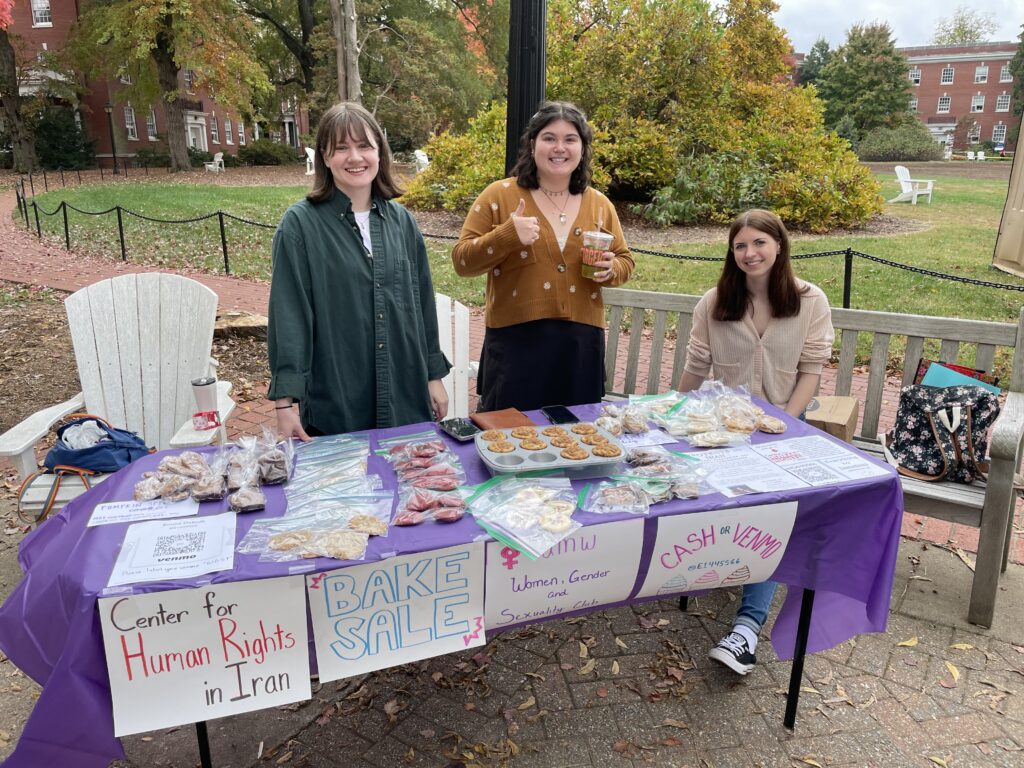Women’s, gender and sexuality club and major demonstrate support for recent Iranian protests
4 min read
Women's, Gender and Sexuality Club bake sale in support of the Center for Human Rights Iran. | Photo courtesy of Anne Smith
ANNE SMITH
Senior Writer
Following the death of Mahsa Amini, a 22-year-old Iranian woman who died in the custody of Iran’s “morality police,” the University of Mary Washington’s Women’s, Gender and Sexuality Club and Women’s Gender and Sexuality Studies Program hosted a bake sale and a panel on Oct. 26 in support of protesters in Iran.
There have been several protests in Iran over the past three weeks as concerns about human rights violations grow. Amini was allegedly arrested for wearing her head scarf too loosely, and the Iranian police claim the cause of her death was heart failure while in custody. However, there have been reports that she died due to blows to the head, and several activists believe that she was killed by law enforcement. Following her death, Iranians’ protests and riots have been met with arrests and oppositional police forces from the Iranian government.
“Women’s rights are human rights,” said WGST Club Secretary Emma Dabolt, a senior English and women’s, gender and sexuality studies double major. “Just because it’s not affecting us directly here doesn’t mean they shouldn’t care about it.”
To raise money for the Center for Human Rights in Iran, the Women’s, Gender and Sexuality Club held a bake sale from 12-2 p.m. on Wednesday, Oct. 26 outside Lee Hall. The Center for Human Rights in Iran seeks to inform governments and other major international organizations about human rights violations within Iran in conjunction with activists, journalists and researchers by reporting in real-time about current conditions and events taking place in Iran.
“We’ll be selling all sorts of baked goods and hopefully people will volunteer to bake for us just to spread awareness about it and also raise money,” said WGST Club President Lucy Clark, a senior English and women’s, gender and sexuality studies double major.
Dabolt emphasized that those who can’t purchase baked goods can still contribute to the cause.
“If you don’t have the funds to pay for a baked good, you could help out by baking something for us, or just spreading the word,” said Dabolt. ”To me, it stands out because we’re not raising this money for ourselves. … We’re trying to raise money for the greater good. I feel like that’s kind of something not all of the other big sales have done.”
On the same day, the club hosted a panel titled Protests in Iran: Context, Strategies and (Likely) Consequences. Panelists included Leila Asadi, an Iranian activist and scholar, Professor of religion Mehdi Aminrazavi and Associate Professor of geography Farhang Rouhani.
“Join us for a panel on the ongoing protests in Iran triggered by the death of 22-year-old Mahsa Amini in police custody,” the event’s flier reads. “For four weeks now, women have been protesting dress and behavior rules despite the government locking down access to the internet and social media.”
Sophomore biochemistry major Harriet King attended the event.
“I think that this was a very impressive panel given how little time it has been since the death of Mahsa Amini; the speakers were very knowledgeable and were able to make a very engaging and relevant presentation,” she said.
Aminrazavi spoke on planned protests in previous revolutions and how they relate to the decentralization of leadership in these more recent protests.
“The other main difference that he described was that in previous protests the emphasis was on text//statements, while this one is very body-central and full of visuality that I feel beautifully encompasses the femininity that the women of Iran are representing,” said King.
The WGST Club comes together to discuss issues and plan events that benefit women and people in the LGBTQ+ community. The club has previously hosted the Executive Director of Repro Rising Virginia and co-sponsored the Oct. 6 walkout supporting the right to choose.
WGST Club Vice President Molly Potock, a senior women’s, gender and sexuality studies major, explained the goals of the club.
“[We] do fundraising for various charities and organizations related to women’s issues, just generally spreading awareness of women’s issues and issues within the queer community and everything on campus to and just talking about,” she said.
The club hopes to continue hosting events to support causes benefitting women and the LGBTQ+ community.
“Hopefully we might do a similar event, even next semester because it’s not like it’s going to end overnight—it’s going to be kind of a long-haul fight for women and queer people in Iran,” said Clark.
Josephine Johnson contributed to reporting for this article.


